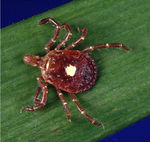Amblyomma spp.
| This article has been peer reviewed but is awaiting expert review. If you would like to help with this, please see more information about expert reviewing. |
These ticks can be identified by;
- Large size
- Ornate scutums
- Eyes present
- Festoons
- Long palps
- Long legs
These ticks are distributed throughout tropical and sub-tropical areas of Africa as well as in temperate North America. The large mouth parts cause large painful bites and allow the females to ingest large volumes of blood which can lead to anaemia.
Amblyomma americanum
| Also known as: | Lone star tick |
This tick is found throughout central and eastern USA and is primarily important as a vector but has also been shown to reduce weight gain in cattle. It is responsible for transmission of Rickettsia rickettsii, Francisella tularensis, Q fever and Berrelia burgdorferi
Amblyomma variegatum
| Also known as: | Bont ticks Variegated or tropical bont tick |
Found throughout Africa, this tick is very important in its ability to transmit Cowdria ruminatium (heartwater) in Africa as well as viral Nairobi sheep disease and Q fever. There is distinct variation in the appearance of the males and female, the males are highly ornate with orange markings on the scutum compared to the brown female with a large pale patch on the scutum.
